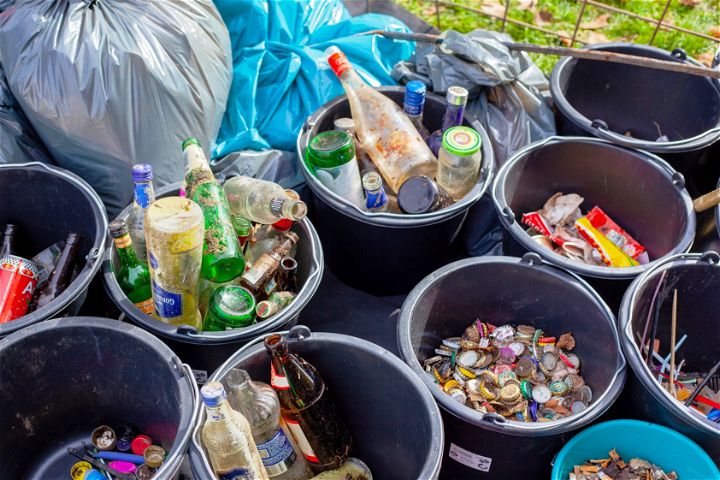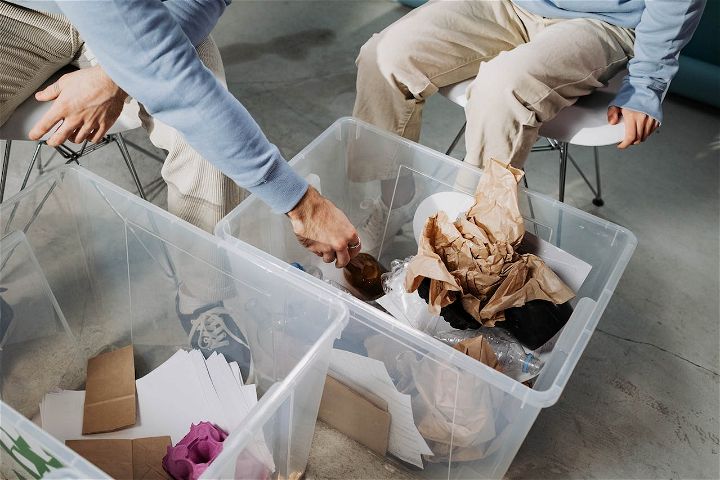Dealing with extra waste can be a challenging task, especially in a world where consumption rates are on the rise. Responsible waste management is crucial for environmental sustainability and the well-being of our communities. In this guide, we’ll explore six tips to help you efficiently clean up that extra waste, promoting a cleaner and healthier living environment.

1. Proper Disposal Methods
Hazardous Waste Handling
Hazardous waste, such as batteries, paint, or electronics, requires special handling. Research local collection events or drop-off locations for hazardous waste disposal. Avoid throwing these items in regular trash to prevent environmental harm.
Electronics and E-Waste Disposal
Electronic waste (e-waste) is a growing concern. Dispose of old electronics responsibly by taking them to designated e-waste recycling centers. Many electronics retailers also offer recycling programs for outdated devices.
Bulky Item Disposal Options
Disposing of bulky items, such as furniture or appliances, requires careful consideration. One thing you can think about is: “How does renting a residential dumpster near me help me dispose of unwanted bulky items?” This option provides convenience and flexibility for the disposal of large items like furniture, appliances, or renovation debris. Also, renting a residential dumpster ensures that you have a designated container on-site, allowing you to discard bulky items at your own pace. Another option is to check with your local waste management authority for scheduled bulk item pickups or explore options for donation or resale.
2. Reduce and Reuse
Minimizing Single-Use Items
Minimizing single-use items is a fundamental step towards reducing waste and promoting environmental sustainability. By consciously opting for reusable alternatives, such as water bottles, shopping bags, and containers, individuals can significantly decrease their ecological footprint. This practice not only minimizes the accumulation of disposable items in landfills but also conserves resources and reduces the energy required for continuous manufacturing. Embracing a lifestyle that prioritizes reusable products contributes to a broader movement aiming for a more sustainable and eco-friendly future. Simple changes, like carrying a reusable coffee cup or using cloth napkins, collectively make a substantial impact on our planet’s health and well-being.
Repurposing and Upcycling
Repurposing and upcycling items present innovative solutions to reduce waste and give new life to old objects. Instead of discarding items that might end up in landfills, individuals can tap into their creativity to transform these materials into something functional or aesthetically pleasing. From turning old furniture into unique pieces with a fresh purpose to upcycling containers for new storage solutions, these practices not only contribute to waste reduction but also embrace a more sustainable and mindful approach to consumption. Repurposing and upcycling encourage a shift in perspective, highlighting the potential value in items that may initially seem disposable. This conscious effort fosters a culture of sustainability, where every object is seen as an opportunity for creativity and environmental stewardship.
Implementing Sustainable Practices
Embrace sustainable habits in your daily life. Consider buying products with minimal packaging, supporting businesses with eco-friendly practices, and choosing products made from recycled materials. Small changes in consumer behavior can have a significant impact on reducing overall waste.
3. Recycling Strategies
Sorting Waste for Recycling
Proper sorting of waste is crucial for effective recycling. Set up a designated recycling area at home and educate family members about what items can be recycled. This simple practice contributes to reducing landfill waste.
Researching Local Recycling Programs
Stay informed about local recycling programs and facilities. Different areas may have specific guidelines for recycling, and understanding these regulations ensures that your efforts align with local practices.
Creative Recycling Ideas for Different Materials
Explore creative ways to recycle specific materials. For instance, glass jars can be used for storage or crafting projects, and cardboard boxes can be transformed into organizational tools. By finding alternative uses for materials, you extend their lifecycle and minimize waste.
4. Composting Solutions
Composting Organic Waste
Composting is an excellent way to manage organic waste, such as kitchen scraps and yard trimmings. Create a composting system at home using a compost bin or pile. The resulting compost enriches the soil and reduces the need for chemical fertilizers.
Setting Up a Home Composting System
Start a simple composting system by collecting kitchen scraps like fruit and vegetable peels, coffee grounds, and eggshells. Combine these with yard waste like leaves and grass clippings to create nutrient-rich compost.
Benefits of Composting for the Environment
Composting not only reduces the amount of organic waste in landfills but also contributes to healthier soil. The composting process helps retain moisture, suppress plant diseases, and reduce the need for chemical additives in gardening.
5. Seeking Professional Services
Waste Removal Services
Consider hiring waste removal services for larger cleanup projects. Professional waste removal companies can efficiently handle bulk waste, ensuring proper disposal and recycling. This option is particularly useful for construction debris or extensive household cleanouts.
Junk Removal Companies
Junk removal companies specialize in hauling away unwanted items. Whether it’s old furniture, appliances, or general clutter, these services can provide a quick and efficient solution for removing larger items that are challenging to dispose of independently.
Dumpster Rental Options
For more extensive cleanup projects, renting a dumpster might be a cost-effective solution. This allows you to dispose of large volumes of waste at your own pace, with the convenience of having a designated container on-site.
6. Educational and Advocacy Efforts
Community Awareness Programs
Participate in or initiate community awareness programs on responsible waste management. Educate neighbors about the importance of recycling, composting, and reducing overall waste. Collective efforts can significantly impact local waste reduction initiatives.
Encouraging Responsible Waste Management Practices
Be an advocate for responsible waste management within your community. Encourage others to adopt sustainable practices, organize neighborhood cleanups, and collaborate with local authorities to improve waste management infrastructure.
Being a Steward of Environmental Sustainability
Take on the role of a steward for environmental sustainability. By setting an example and promoting responsible waste management practices, you contribute to a broader movement toward a cleaner and healthier planet.

Cleaning up that extra waste requires a multifaceted approach that combines reduction, recycling, proper disposal, composting, professional services, and community engagement. By implementing these tips, you not only contribute to a cleaner and more sustainable environment but also inspire others to adopt responsible waste management practices. Each small effort adds up, creating a positive impact on our communities and the planet as a whole.




